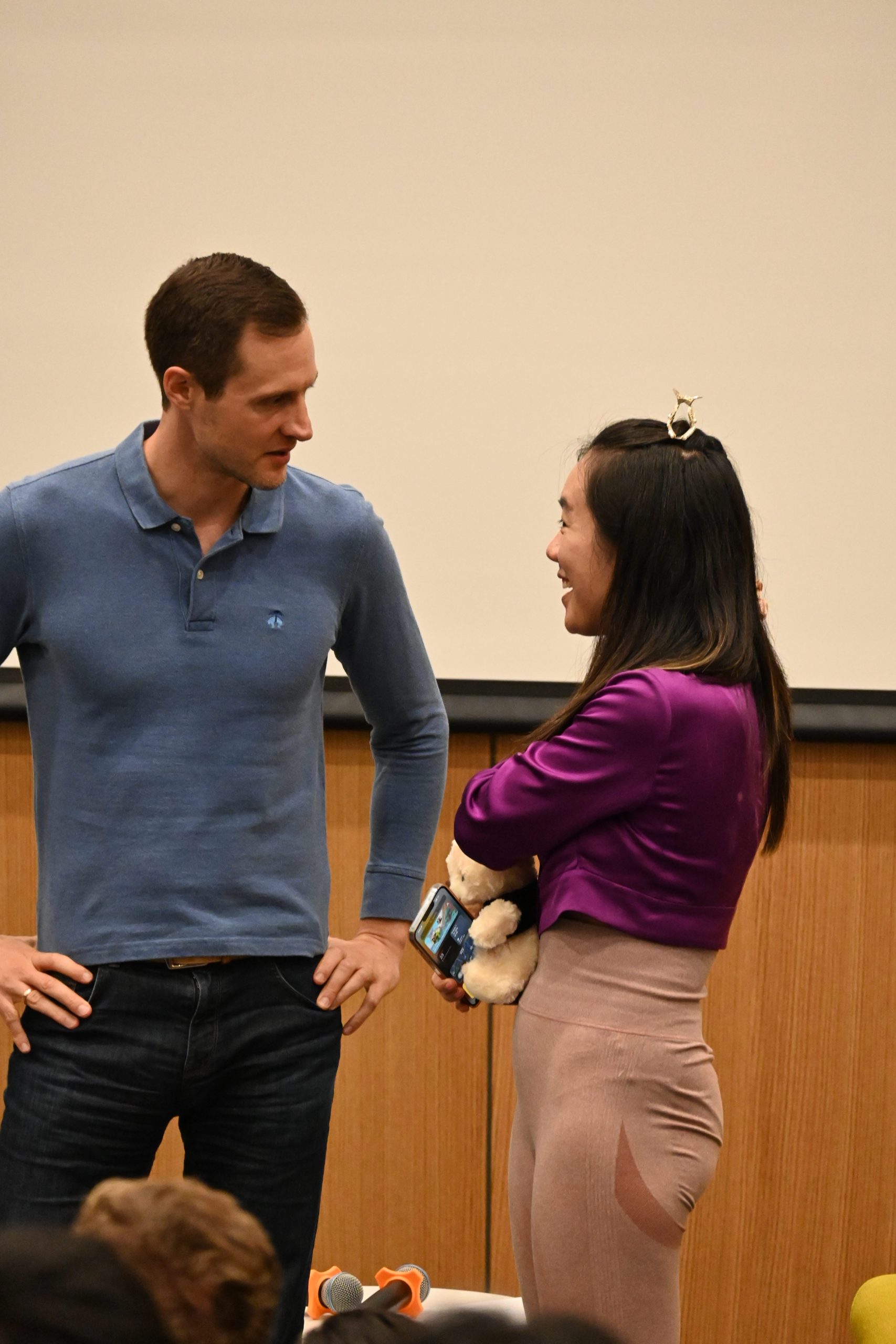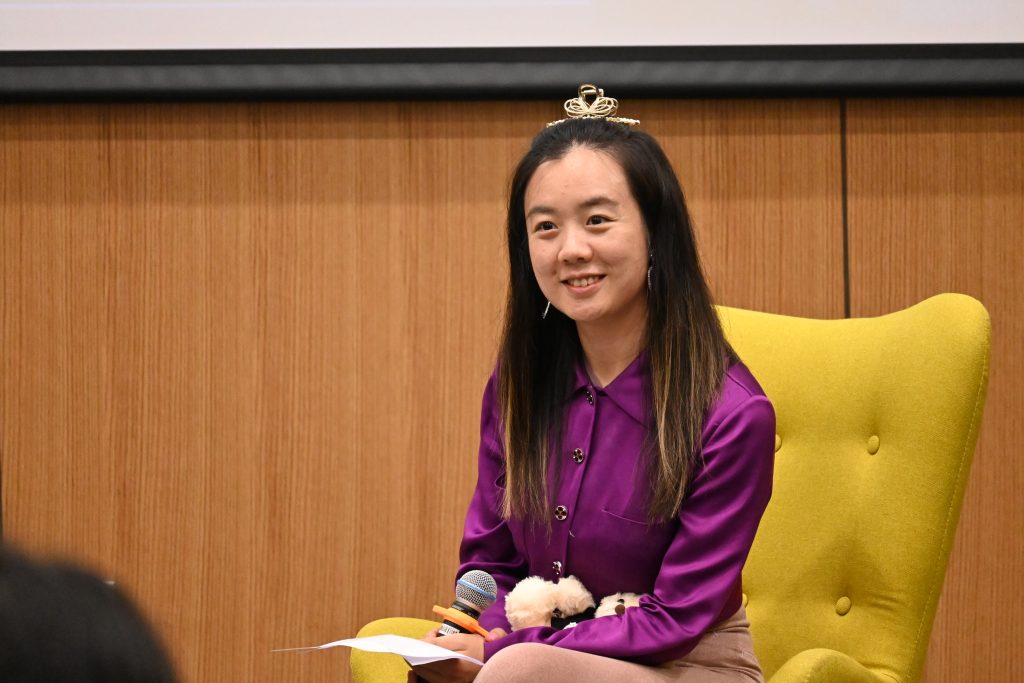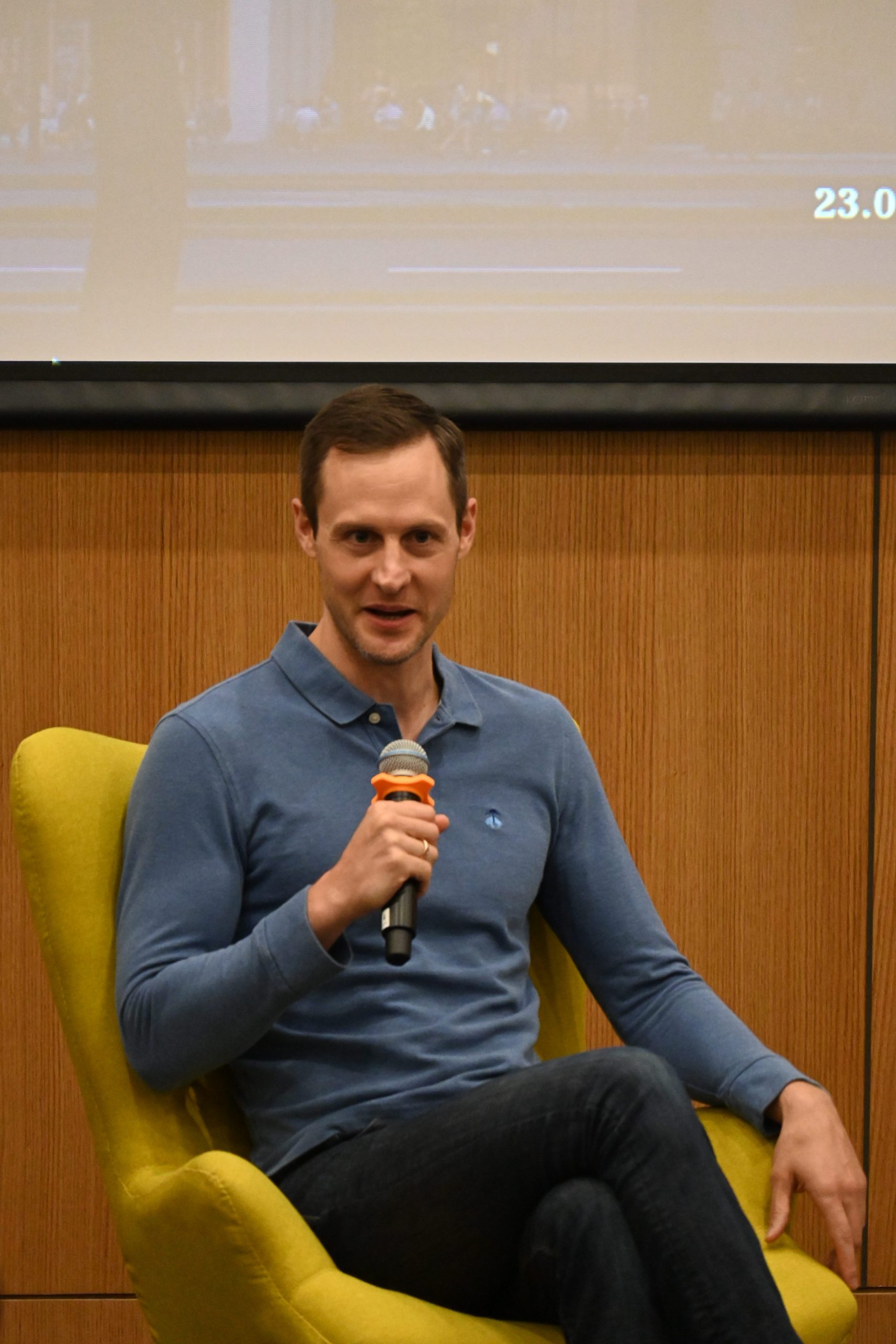The following article is part three of a five-part series…
Pudong New District, Shanghai
DKU’s Finance Club travelled to Shanghai for a day of learning from industry experts on economics, finance and doing business in China last month. Titled the “Chamber of Commerce” weekend, the event was held at NYU Shanghai’s new Qiantan campus in Pudong New District by NYU Shanghai’s Economics Society, the NYU Shanghai Economics Department and the Tamid Group at NYU Shanghai.
The all-day conference featured five panels including: supply chains and manufacturing, finance, technology, trade and infrastructure and real estate. With a special centering on China’s financial capital of Shanghai, the Sep. 23 event gave students the latest information and analysis on each respective topic from experts who had weathered the Covid-19 pandemic.
The speakers at the event included NYUSH professors, business professionals and representatives from multiple chamber of commerce organizations located in Shanghai including the American Chamber of Commerce (AMCHAM) and the Israeli Chamber of Commerce. A question and answer session followed each panel conversation in addition to a chance to meet and chat with panel experts.
Each panel was held in a large lecture hall while breaks between the sessions allowed students to continue conversations with the experts or explore the NYUSH Qiantan campus.
Panel 3/5: Technology
Moderated by DKU’s Assistant Professor of Economics, Luyao Zhang, the technology panel brought the latest on Shanghai and China’s role in transformative high technologies such as generative AI, security and privacy issues and strategy on the behalf of the Shanghai and central governments.
Erik Walenza-Slabe, the sole panel speaker, articulated his understanding of Shanghai as a global technology and entrepreneurial hub in relation to his over a decade experience working as a management consultant in the city. Walenza currently serves as CEO of IoT ONE, a firm which helps companies digitalize their operations and as chair on the AMCHAM’s Tech and Innovation Committee.

Echoing the format of the event’s prior panels, Zhang kicked off the panel asking about Shanghai, specifically about the city’s innovation ecosystem, the role of government initiatives and how the city is fostering cooperation between domestic and international firms in the modern day.
“A lot of companies will have a technology center in their headquarters and they’ll have one in Shanghai, and maybe they’ll have one in Silicon Valley.”
erik walenza-slabe
Walenza asserted that Shanghai has become both a domestic and international tech hub, motivated by favorable government policy which has attracted talent from both across China and around the world.
Possessing more fortune 500 companies than anywhere else in the globe, the city is frequently a top location for foreign firms looking to establish tech centers, the panelist claimed.
With government incentives keeping the city an attractive location for both domestic and foreign players, Walenza pointed towards tax incentives, strategic infrastructure development and strategic state-led investment as responsible for the city’s success.
“They’re very strategic in infrastructure, they’re very strategic in incentives to attract talent, to attract companies to invest, they’re very strategic in picking industries that they think will be important, trying to pick winners to some extent.”
erik walenza-slabe
The Shanghai city government is “very strategic in picking industries that they think will be important” Walenza explains. Both a strength and weakness, the government sometimes picks winners but sometimes “end up burning a lot of money.”
However, Walenza highlighted a drawback to the Shanghai model that can be understood as a nationwide problem. Walenza explains that the city government has had success in picking winners in proven tech industries but less so in unproven ones.
Highlighting industries such as solar, Shanghai’s success has been in scaling up proven technologies and “doing it better than anyone else,” Walenza exclaimed. However, state-investment has not seen the same success in unproven technologies.
Raising the recent case of Open AI, Walenza questioned whether such a company could be built in Shanghai. Raising billions in investment prior to their releasing of a product, investment into Open AI was risky, the panelist explained. However, Open AI in the end released a revolutionary product, changing how people think about artificial intelligence (AI).
With 70 to 80 percent of venture capital and private equity in Shanghai linked to the state in one way or another, the question is whether the government would take such a risk, Walenza explained.
Balancing Big Tech Development with Security and Privacy Concerns
Zhang’s next question targeted an indispensable part of Shanghai’s aim to become a high technology leader: how the city balances the promotion of Big Tech with data security and privacy.

A question each nation involved with advanced technologies are dealing with, China has adopted their own stringent data security and privacy laws and regulations that companies -both foreign and domestic- must comply with.
Illustrating the challenges ‘big tech’ companies face when looking to expand into China, Walenza highlighted AI, explaining that companies cannot simply build an AI product in the West and sell it in China.
“You’re not going to be able to build an AI product -for example- in Silicon Valley or in Munich and then just sell that in China. You’re going to have to do a lot of localization of your tech stack in order to make that product actually comply in China,” Walenza explained.
The data security and privacy issue is a “China issue” rather than one relegated to Shanghai as companies looking to set up in the city must comply with national policies, the AMCHAM chair asserted.
A topic that “has been on everybody’s agenda… since 2018,” Walenza stated that like all policy in China, questions concerning data security and privacy follow general directions coming from Beijing with the bureaucracy subsequently figuring out the details.
“The way the government in China often works is Beijing will say ‘this is the direction we’re going in’ and they’ll give some kind of general principles and then it takes time for the different parts of the bureaucracy to put in place the details… what does this actually look in practice.”
erik walenza-slabe
With Chinese bureaucracy regulating all things data in real time, the panelist explained that companies remain “in limbo,” waiting on regulators and relevant agencies to form a policy direction.
The hurdles that companies are facing most significantly include restrictions on moving data outside of China. Walenza explained that regulations require that any data collected on Chinese nationals must be stored within the borders of China with restrictions in place regarding the movement of such data.
Exemplifying the regulatory burden that companies must comply with, while approximately 800 companies have applied to transfer data abroad with the local regulatory branch, around 34 of those requests were submitted to the central regulatory body, with only 3 requests finally granted, Walenza asserted (approximate figures). Companies have been directly submitting requests to the local regulator due to restrictions in data sharing hampering business operations, the speaker explained.
“We’re just kind of in this limbo where you can tell that the bureaucracy is kind of trying to figure this out -right- as they go, and that’s often what works in China… you have this concept of ‘crossing the river and feeling for stones, but once you cross the river you have a path,’” the panelist articulated.
New Tech Fields, Generative AI & Semiconductors
Placing Shanghai in context of global debates over the opportunities and concerns presented by new technologies such as generative AI, quantum computing, blockchain and crypto-currency, Zhang asked about the city’s attitude to these innovative technologies.
Identifying a “big shift” over past couple years, in 2015 to 2016 venture capital in China was focused on consumer digital applications such as finance and or e-commerce, Walenza explained. However today investment has shifted to areas such as “hard tech,” chemistry, new materials, pharmaceuticals, electric vehicles and batteries.

Areas that “China will highly excel” in, according to the speaker, these industries do not pose social stability concerns for Beijing and simultaneously “convey hard power to some extent.”
Although these areas came naturally to China according to Walenza, technologies such as generative AI “are more of a question mark,” due to on one hand being a powerful technology for companies and individuals while posing risks for Chinese leadership given its probabilistic nature.
Explaining that the initial regulation draft for generative AI was “written so that it would basically kill the industry” according to Walenza. after a review process and likely lobbying from industry players, the regulators came out with a practical regulatory framework which prescribes the continual improvement of inputs and outputs of AI platforms.
Although regulation is a problem that can be improved upon, Walenza raised the issue of China’s access to semiconductors. Limited by US sanctions, China is unable to import and or manufacture the latest generations of chips needed for technologies such as generative AI.
Putting forth the case that this issue will not be an end-all-be-all, the AMCHAM chair explained that while in some use-cases companies operating in China will be severely limited by chip inaccessibility, in most cases, companies will be able to get by without the latest chips.
The speaker articulated that although efficiencies may take a hit in some industries, “China has efficiencies in other areas” including “system-level efficiencies” that can counterbalance restrictions on the latest chip hardware.
Privacy, IP and China as the Arena
Zhang’s last question touched upon a sensitive issue at the heart of developing tech in China, intellectual property (IP).
Continuing with the focus on generative AI, Walenza explained that China and the US are the only serious players in the industry. Citing strict European data privacy laws and Europe’s inability to scale companies, “if you’re going to play this [AI] game, you’re either going to do it in the US and China,” he stated.
In terms of the IP of generative AI, Walenza highlighted the difficulty with protecting AI algorithms with intellectual property, given the ease through which AI models can be reengineered into similar but different products.
On the issue of “court protection frameworks,” according to his clients, China’s regulatory frameworks are very modern. However, concerning Chinese courts, Walenza explained that first tier court systems are modern “and often quite fair” while there remains issues in second and third tier cities lying in the separation of the government and the court system.
In second and third tier cities, problems sometimes arise when “local champions” are challenged in court by other domestic or foreign firms where the independence of local courts with local government comes into question. Asserting China’s financial structure to not be changing anytime soon, this problem will continue to persist, the speaker said.
Despite the issue of copying and IP theft in China, some firms have formed a new philosophy when it comes to IP and competing in Chinese markets.
“If you bring a good solution into China, there will be five or six companies copying you in six months,” Walenza explained. Understanding this, many companies choose to remain in China nonetheless, trying to “run faster” than the competition in terms of innovation.
“You’re going to be copied… you just have to run faster,” the speaker said. Companies have accepted this facet of innovating within China in part due to an inability to fight IP theft in Chinese courts.
The philosophy derives from a belief that competing in China is an essential part of becoming a global industry leader.
“Shanghai or China is so fiercely competitive… a lot my clients now talk about it as the arena, this is where you come to fight,” Walenza stated.
In the context of globalized markets, if companies do not attempt to take market share in China, Chinese companies will come to Western countries and “will eat their lunch.”
Stating that he has witnessed a “significant change in mindset,” some companies see competing in China -along with the involved risks- as a learning experience, giving companies an edge in competing globally, Walenza explained.
Erik Walenza-Slabe, with over 12 years having lived in Shanghai, is the CEO of IoT ONE, a consulting firm aiming to help multinational companies grow in Asia through the use of digital technologies. Walenza started his career in Shanghai focused on cost and capital consulting before forming his own firm IoT ONE. Walenza-Slabe is a chair on the Technology and Innovation Committee at AMCHAM Shanghai and helped to run the Shanghai branch of global entrepreneurial organization, Start Up Grind. Walenza is also part of the government program, Alliance of Industrial Internet, which focuses on industrial IoT and regulation of industry.
Luyao Zhang, is an Assistant Professor of Economics and a Senior Research Scientist at the Data Research Center at DKU. Zhang’s research interests focus on “the interplay of computational and economic science around the application of groundbreaking technologies, including artificial intelligence, blockchain and cryptography, and innovative computing.” Zhang’s publications have appeared in numerous economic and computational science journals, in addition to conference proceedings of general interest and beyond.” Zhang has taught courses on topics including economics, statistics, machine learning and more in addition to participating in a range of research projects across institutions. Read more about Professor Zhang here.

